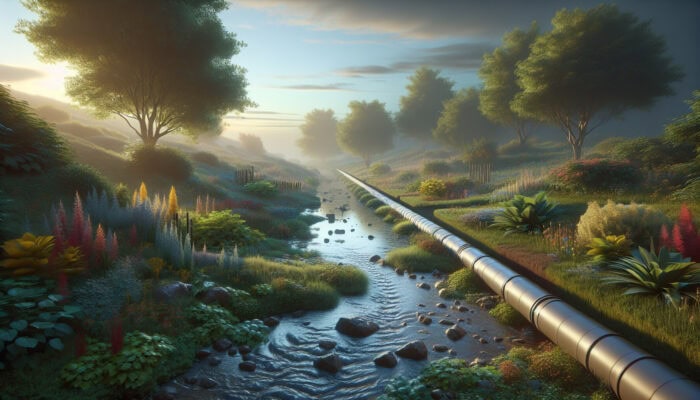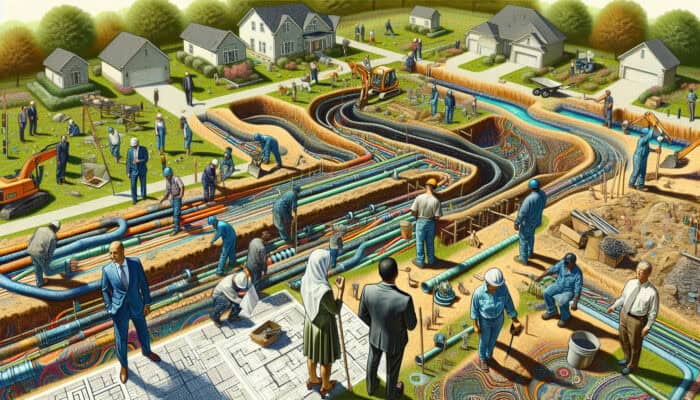Comprehensive Overview of Landscape Drainage Solutions
What is Landscape Drainage and Why is it Important?

Landscape Drainage Services in West End Vancouver: Landscape drainage refers to the essential practice of effectively managing excess water to safeguard properties from potential damage that can arise from flooding or erosion. This involves a variety of systems, including French drains, surface grading, and swales, all designed to redirect water away from vulnerable areas. The primary aim is to ensure that landscapes remain healthy and functional, preventing common drainage issues that homeowners might face, such as:
- Water pooling in yards.
- Basement flooding
- Soil erosion
- Inadequate water flow away from foundations
- Driveway washouts
- Mould and mildew growth due to excess moisture
- Plant and lawn health deterioration
For homeowners, understanding the intricacies of landscape drainage is crucial, particularly in regions like the West End of Vancouver, where heavy and frequent rainfall can create significant challenges.
Why Proper Drainage is Essential for Your Property
The significance of proper drainage cannot be overstated. Firstly, it plays a pivotal role in preventing soil erosion, which can jeopardize not only the landscape but also the structural integrity of buildings. Unchecked water flow can undermine foundations, leading to costly repairs over time. Additionally, effective drainage maintains the health of your landscape by ensuring that plants receive just the right amount of water without becoming waterlogged. This equilibrium is vital for both residential and commercial properties, as it sustains aesthetic appeal and preserves property value.
Moreover, properly designed drainage systems help mitigate health hazards associated with standing water, including insect infestations and mould growth. By investing in high-quality drainage solutions, homeowners can create a safer living environment while also enhancing the value and appearance of their properties.
Advantages of Professional Drainage System Installation
Choosing to have drainage systems professionally installed offers numerous benefits. For one, experienced experts ensure that the drainage solutions are meticulously designed and implemented based on the unique conditions of each property. This includes factors such as soil type, topography, and existing infrastructure. Such a tailored approach significantly enhances the efficiency and longevity of drainage systems.
Furthermore, professional installation can lead to long-term financial savings for homeowners. By addressing drainage issues proactively, the risk of incurring costly repairs related to water damage is greatly diminished. Many professionals also provide warranties on their work, offering peace of mind that the system will function effectively for years to come.
In-Depth Insights on Landscape Drainage Services in West End, Vancouver

What Unique Challenges Does West End Present?
The West End of Vancouver is characterized by its dense urban landscape and unique geographical features, including proximity to the coast and surrounding hills. These characteristics contribute to a specific set of challenges regarding landscape drainage. The high levels of rainfall experienced in this area necessitate drainage solutions that can effectively manage sudden and heavy downpours, which are particularly prevalent during the wetter months.
Local experts have successfully implemented various strategies, such as French drains and permeable paving, across different properties to address these drainage challenges. A notable case involved a residential project where French drains were installed to redirect water away from a basement that frequently experienced flooding. This solution not only safeguarded the home but also improved the overall landscape, resulting in healthier garden beds that thrived without the risk of waterlogging.
How Can You Select the Most Suitable Drainage System?
Choosing the right drainage system for your property is critical and depends on numerous factors, including soil type, topography, and prevailing water flow patterns. In the West End, where clay soils are commonly found, it may be necessary to implement systems that enhance drainage, such as French drains or dry wells.
For properties with significant slopes, surface grading can efficiently redirect water away from the foundation. Homeowners should also take into account any existing structures or landscaping features that could influence drainage patterns. Engaging with a local drainage professional can yield customized recommendations, ensuring that the selected system effectively addresses the specific drainage challenges prevalent in the area.
What is Involved in the Installation Process?

The installation process for landscape drainage systems encompasses several essential steps. Initially, a comprehensive site assessment is conducted to evaluate current conditions and pinpoint problem areas. Following this assessment, the drainage system is designed, taking into consideration the unique features of the property and the best solutions to address these challenges.
Once the design is finalized, the implementation phase begins, which may involve excavation for trenching, installation of drainage materials, and ensuring proper grading. Homeowners are encouraged to remain engaged throughout the process, asking questions and providing input to ensure that the final system aligns with their expectations. By understanding each phase of installation, homeowners can effectively prepare their property for a seamless process.
Identifying Common Drainage Problems in West End, Vancouver
What Factors Contribute to Poor Drainage?
Poor drainage in the West End can arise from numerous factors, including heavy rainfall, soil compaction, and improper grading. In urban environments where impervious surfaces, such as asphalt and concrete, are prevalent, water often struggles to flow naturally, leading to pooling and flooding. Additionally, soil compaction often occurs due to foot traffic or heavy machinery, further reducing the ground’s ability to absorb water.
Improper grading can exacerbate drainage issues, as it may cause water to flow toward rather than away from structures, increasing the risk of water-related problems. Recognizing these causes is key to effectively addressing drainage problems and implementing suitable solutions tailored to the unique conditions of West End properties.
What Signs Indicate Drainage Issues?
Early identification of drainage problems can prevent substantial property damage. Common signs that suggest drainage issues include:
- Water is pooling in various areas of the yard
- Consistently soggy ground
- Basement or crawl space flooding
- Cracks in foundation walls
- Mould or mildew growth inside or around the property
- Unusual plant growth patterns, with some areas flourishing and others dying
- Water stains on walls or floors
Being vigilant for these indicators enables homeowners to address drainage concerns promptly before they escalate into costly repairs.
What Solutions are Available for Specific Drainage Problems?
Effectively addressing drainage issues requires tailored solutions based on the specific problem at hand. For example, if water pooling arises due to poor grading, simple adjustments to the landscape’s slope may resolve the issue. In more complex situations, such as chronic basement flooding, a comprehensive drainage system may be required.
In instances of severely compacted soils, aeration techniques can significantly improve water absorption. Furthermore, the installation of catch basins or perforated pipes can facilitate better water management in areas prone to excessive moisture. Customizing solutions to fit the unique challenges of each property ensures effective drainage and long-term viability.
How Does Poor Drainage Affect Property Value?
The consequences of poor drainage extend beyond immediate discomfort; they can considerably impact property value. Properties with unresolved drainage issues often face depreciation due to the risk of water damage, structural compromise, and the potential for costly repairs. Homebuyers are increasingly aware of the significance of solid drainage systems and may hesitate to invest in properties that show signs of water-related problems.
Conversely, addressing drainage concerns can enhance property value by showcasing proactive maintenance and care. Well-managed drainage systems contribute not only to the structural integrity of homes but also to their overall aesthetic appeal, making them more attractive to potential buyers.
Essential Maintenance Practices for Your Drainage System
What Regular Maintenance Tasks Should You Perform?
Maintaining your drainage system is crucial to ensure its longevity and effectiveness. Regular maintenance tasks encompass:
- Cleaning gutters and downspouts to prevent clogs
- Inspecting drainage systems for signs of wear or blockage
- Ensuring proper water flow around the property
- Checking for sediment buildup in drainage areas
- Monitoring plant health, as overly moist areas may indicate drainage issues
- Trimming vegetation around drainage systems to prevent obstruction
- Evaluating the condition of drainage materials periodically
By incorporating these maintenance tasks into a regular schedule, homeowners can avert major drainage issues and extend the life of their systems.
When Should You Consult a Professional?
Homeowners should consider reaching out to a professional drainage service when they notice persistent pooling of water, unusual odours, or signs of system failure, such as water backup. If there are uncertainties regarding the maintenance of the drainage system or if problems persist despite maintenance efforts, seeking expert intervention becomes essential.
Professional services offer a comprehensive assessment and can recommend effective solutions to restore proper drainage, thereby preventing further complications. Recognizing when to seek help can save both time and resources in the long run.
What Are the Costs Associated with Drainage System Maintenance?
The costs associated with maintaining a drainage system can vary widely based on several factors, including the system’s complexity, the frequency of service, and its location. Homeowners should anticipate budgeting for routine inspections, cleaning, and potential repairs.
Typically, routine maintenance can range from a few hundred dollars annually to more substantial expenses for complex systems requiring frequent professional intervention. Understanding these costs enables homeowners to incorporate them into their overall property management budget, ensuring that drainage systems remain functional and effective.
Research-Backed Advantages of Landscape Drainage Services in West End, Vancouver
How Can Effective Drainage Enhance Property Value?
Implementing effective drainage systems can significantly elevate property value by preventing water damage and promoting landscape health. For example, properties that have integrated advanced drainage solutions, such as permeable pavers or green roofs, have witnessed increases in market value due to their reduced risk of flooding and enhanced overall aesthetic appeal.
Moreover, homeowners in the West End have reported successful sales outcomes after rectifying drainage issues, as potential buyers appreciate well-maintained landscapes that signify lower future maintenance costs. Investing in proper drainage not only secures the property but also serves as a compelling feature in real estate listings.
What Are the Environmental Advantages of Proper Drainage?
Proper drainage systems offer substantial environmental benefits by minimizing runoff and preventing soil erosion. When water is effectively managed, it reduces the risk of pollutants entering local waterways, thereby fostering a healthier ecosystem. Additionally, well-designed drainage solutions can enhance groundwater recharge by allowing water to infiltrate the soil instead of running off.
In urban areas like the West End, adopting sustainable drainage practices can help prevent floods while enhancing the resilience of the natural landscape. By supporting local ecology through effective drainage, homeowners make a positive contribution to both the environment and their community.
What Do Studies Reveal About Drainage Efficiency?
Research indicates that well-designed drainage systems substantially reduce water-related issues, enhancing both property value and the usability of outdoor spaces. Studies have shown that properties equipped with effective drainage solutions experience fewer instances of flooding and water damage, thereby lowering long-term maintenance costs.
Experts consistently advocate for customized drainage strategies that take into account local climate and soil conditions, as these elements are critical for maximizing efficiency. Analyzing recent research findings highlights the importance of investing in high-quality drainage solutions, particularly in regions prone to heavy rainfall, such as the West End.
How Can Drainage Improve Outdoor Living Spaces?
Effective drainage plays a crucial role in enhancing outdoor living spaces. By preventing waterlogging, homeowners can create functional patios, gardens, and recreational areas that remain usable throughout the year. Well-drained landscapes provide the ideal foundation for outdoor furniture, barbecues, and gatherings, ensuring that these spaces stay welcoming.
Moreover, proper drainage contributes to healthier plant growth, allowing landscaping efforts to flourish without the risk of over-saturation. Homeowners can maximize their enjoyment of outdoor spaces while simultaneously increasing property value through thoughtfully designed drainage solutions.
What Are the Long-Term Financial Benefits of Investing in Drainage?
Investing in high-quality drainage solutions yields significant long-term financial benefits. By implementing effective systems, homeowners can mitigate risks associated with water damage, which can lead to substantial financial losses. Proper drainage reduces the likelihood of costly repairs related to flooding, foundation issues, and mould remediation.
Additionally, maintaining a robust drainage system can enhance overall property value, resulting in a better return on investment over time. For homeowners in West End, this means that a proactive approach to drainage not only protects their property but also represents a prudent financial strategy.
Selecting the Right Landscape Drainage Service Provider
What Key Qualities Should You Look for in a Drainage Company?
When selecting a drainage service provider, it is crucial to consider several key attributes. Seek out companies that possess:
- Proven experience and expertise in landscape drainage
- Relevant certifications and licenses
- A strong reputation within the local community
- Comprehensive service offerings to address various drainage challenges
- Transparent pricing and detailed estimates
- Positive customer testimonials and references
- A commitment to sustainable practices and eco-friendly solutions
These qualities signify a reliable provider capable of delivering effective drainage solutions tailored to your property’s unique needs.
How Can You Assess a Company’s Previous Work?
Evaluating a drainage company’s past work is crucial for making informed decisions. Begin by checking references and requesting testimonials from previous clients. Additionally, viewing before-and-after photographs of completed projects can provide valuable insight into the quality and effectiveness of their work.
Understanding the scope of prior projects will also help assess whether the company has experience with situations similar to yours. This thorough evaluation process ensures that homeowners select a provider with a proven track record of success in landscape drainage.
What Critical Questions Should You Ask Before Hiring?
Before hiring a drainage service provider, asking the right questions can clarify expectations and ensure a good fit. Inquire about their experience with local drainage issues, the specific methods they employ, and any warranties they offer on their work.
Additionally, request detailed cost estimates and timelines for project completion. Clear communication regarding strategies, materials, and maintenance can foster a collaborative relationship, ensuring that your drainage needs are effectively met.
Future Directions in Landscape Drainage
What Innovations Are Emerging in Drainage Solutions?
The landscape drainage field is rapidly evolving, with various innovations emerging to enhance efficiency and sustainability. Smart drainage systems equipped with sensors can monitor moisture levels and automatically adjust water flow, optimizing both performance and resource use.
Furthermore, eco-friendly materials and techniques, including green roofs and rain gardens, are gaining traction. These solutions not only manage water effectively but also have a positive impact on the environment, making them ideal choices for environmentally conscious homeowners. As these trends continue to evolve, they will shape the future of drainage solutions, particularly in urban areas such as the West End.
How Will Climate Change Affect Drainage Needs?
Climate change is likely to have a significant impact on drainage requirements in the West End and beyond. Increased rainfall intensity can worsen existing drainage problems, necessitating more robust and resilient systems to manage higher water volumes.
Understanding these future challenges is essential for both homeowners and drainage professionals. By anticipating changes and investing in advanced solutions, property owners can better prepare for the evolving landscape of water management.
What Role Does Technology Play in Modern Drainage Solutions?
Technology is increasingly playing a vital role in landscape drainage solutions, particularly in design, monitoring, and maintenance. A softwSoftware enables the modelling system to allow individuals to predict potential issues and develop effective solutions.
Moreover, smart technologies facilitate real-time monitoring of drainage systems, alerting homeowners to potential failures or blockages before they escalate into costly problems. The integration of technology into drainage solutions enhances overall effectiveness and efficiency, greatly benefiting homeowners in West End.
How Will Urbanization Shape Future Drainage Needs?
As urbanization continues to expand in the West End, the demand for innovative drainage solutions increases. The prevalence of impermeable surfaces, such as roads and buildings, can lead to higher runoff volumes, intensifying the risk of flooding in urban settings.
To address these challenges, developers and homeowners must explore sustainable drainage practices that effectively manage increased water flow. Implementing strategies such as permeable paving and green infrastructure will be crucial in maintaining a balanced urban ecosystem while preventing flooding.
Frequently Asked Questions About Drainage
What are the common signs of drainage issues?
Common signs include water pooling, soggy ground, basement flooding, and mould growth. Noticing these early indicators can help prevent major damage.
How often should I maintain my drainage system?
Regular maintenance is recommended at least once a year, but more frequent checks may be necessary in areas with heavy rainfall or following severe weather events.
What is the average cost of drainage installation?
The cost of drainage installation can vary widely based on system complexity and property size, typically ranging from a few thousand to tens of thousands of dollars.
Can I install drainage systems myself?
While some homeowners may have the skills to install basic systems, professional installation is advisable for complex drainage solutions to ensure proper design and effectiveness.
How can I prevent drainage issues?
Regular maintenance, proper grading, and investing in effective drainage solutions can significantly help prevent drainage issues from arising.
What types of drainage systems are best for clay soil?
French drains and dry wells are often suitable for clay soils, as they assist in redirecting excess water away from problem areas.
Do drainage systems require a permit in Vancouver?
Yes, certain drainage installations may require permits. It’s crucial to check with local authorities before proceeding with any drainage project.
How long does a drainage system last?
With proper maintenance, most drainage systems can last over 10 years; however, some components may require replacement sooner due to wear and tear.
What should I do if my drainage system is clogged?
If you suspect a clog, inspect the system for visible blockages and clear them if it is safe to do so. Otherwise, consult a professional for assistance.
Are eco-friendly drainage solutions available?
Yes, many eco-friendly drainage solutions, such as rain gardens and permeable pavers, are designed to manage water sustainably while benefiting the environment.

